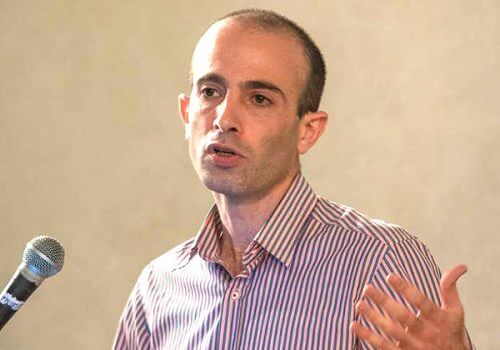"I am convinced that there are still safe professions - things must be found in which people are strong in certain positions, and there will always be ethical issues where people will have to make a decision," said Prof. Marie Flanagan, scientist, inventor, artist and social science expert * on the panel that dealt with changes Prof. Yuval Noah Harari also participated in the labor market, who said: "There was a constant fear that the machines would take over professions and make people irrelevant, but this is a cry of a wolf, a wolf - when the wolf finally came, it turns out that it wasn't so bad."

The changes in the labor market was one of the topics that was at the center of the World Economic Forum that convened every year in January in Davos, Switzerland.
Among other things, a panel was held as part of the conference that dealt with changes in the perception of work under the title Putting Jobs Out of Work. As in the famous parable that some of the panel members used - the question is not whether the wolf will come but when, and what the intensity of its damage will be and what the government should do to reduce the intensity of the damage.
Among the participants in the panel, Prof. Yuval Noah Harari, the historian from the Hebrew University and the author of the book "A Brief History of Mankind", Prof. Marie Flanagan - Scientist, inventor, artist and social science expert, and also serves as a professor at Dartmouth College in Hanover, New Hampshire, S. Vijaykumar, CEO HCL Technologies, AndArlie Russell Hochschild, a sociologist at the University of California at Berkeley. The panel was moderated Andy Server, the editor-in-chief of Yahoo Finance.
Can we change our perception of attitude to work?
"It's an important question because it's based on history," Flanagan said. "If we didn't have the concept of nine to five before - we have it today."
"Now we see changes to unfamiliar forms of work, for example thinking about technological partnerships with groups of people working independently without a corporate structure, collaborative forms of new initiatives. I think we will see new formats of companies and corporations".
"We still don't understand this in depth today, but for example we can see for example the trend towards handmade production, despite the automation and thanks to technological progress we can return to a kind of fetishization of boutiques. And we should not forget the new markets that will appear when we have more capabilities. We will also need more people in several places."
As a researcher in the field of artificial intelligence, could you explain to us how AI will affect the field of work?
"We all know that technology makes jobs redundant or at least changes them, I can only describe my point of view. For me, AI is a term synonymous with automation and the transfer of some simple tasks to the hands of computers, up to applications such as Big Data and others, which create new knowledge."
"It can be said that artificial intelligence works on many different levels. I am interested in the question of how humans fit into this equation. It doesn't exactly change jobs or eliminate jobs. In some cases, the AI will be a work partner or improve jobs. My fear as a social science researcher is to go back to the way people were brought up to think about it."
"How do you take someone who works in a supermarket and help them change their toolbox to a different type of work - this is the equation that the company needs to think about."
"This is a bit of a trick question. I don't think we are ready for that, even in terms of adapting the education system and preparing society for it."
Do you know people who use creativity to redefine their work?
"Already in 1973, the artist Harold Cohen developed a type of artificial intelligence that would draw paintings as he wanted to draw but thought he was a bad artist, so he developed an AI called "Aaron". Aharon started to draw pictures and sell them. Cohen drew the paintings in collaboration with artificial intelligence, as a tool to carry out the creative process. Today many artists consider themselves technology artists. This is just one example that can show us where this kind of integration is going."
"The collaboration between humans and machines is the ultimate paradigm. Also, the person will always be required to perform non-repetitive work and deal with unexpected events like a plumber. Therefore, today, plumbing is a very safe job in terms of its continuity."
"Humans may be slightly better at a certain task than a computer, although you can never say never. Technology can always surprise us. However, I don't think there is a burning desire to build an artificial intelligence that will replace artists. It is interesting to think about how to mechanize professions such as project management which is a profession that requires multiple tasks. How will the computer be able to tell the workers what to do and when"?
"I am convinced that there are still safe professions," says Flanagan. "This is a kind of thought experiment that may help us try to find things that humans are strong in in certain positions, and there will always be ethical issues where humans will have to make a decision."
"I got to see algorithms that deal with the question of ethics in Silicon Valley. Sometimes it works and sometimes it doesn't, and they don't have a great success rate when it comes to ethical questions. There are indeed questions where the success rate depends on the abilities of their programmers. An example of this is confessional software that will make better decisions than the priest. In Louisiana, there is a church on every street corner, and I don't think they will use this app, because they are afraid of losing human morality."
"It is estimated that as the unemployment rate increases, there will be many people who will not find their way. Some will turn to religion, others to drugs. Then unfortunately they will have to create a new type of jobs. The first responders in New Hampshire are very busy because of the huge death rates as a result of heroin consumption."
"That's why government intervention is required to help people transition to new jobs. For example a program in West Virginia that helps coal miners become programmers. Although it sounds silly, 700 people signed up for this course. They program apps for cell phones. Will this work also be automated? Probably in the end yes, but in any case these are old people"
"People will have to reinvent themselves every 10 years"

Nach-Harari, from the Hebrew University, addressed moderator Andy Sarver's question about the changes that are taking place in the concept of work.
"Although this is a difficult and too broad question because this concept has changed many times throughout history. The concept that I have a profession and I arrive at the office at eight and leave at five is a relatively modern concept. This is not the way hunter-gatherers for thousands of years treated work. They had no doubts or anxiety about losing their jobs. This is also a new phenomenon that has developed in the last 200-300 years. There has been a constant fear that the machines will take over professions and make people irrelevant, but this is the cry of a werewolf. When the wolf finally arrived, it turns out that he wasn't so terrible."
According to Sarver, "I don't feel that people understand that a crisis is going to happen. At least in the United States I haven't heard the left or the right say 'hey, automation is already here and we need to see what is being done in France. For example, continuing education. The fear is that the political leaders will use the anxiety that the crisis creates to blame innocent people such as blacks or immigrants."
One of the studies presented at the forum predicts that about a third of all jobs are in danger of digital transformation - from freezers to truck drivers and office workers, bankers and lawyers. However, the research also showed that jobs are also being created that require completely new skills.
"The big question is, will people be willing to reinvent themselves to fulfill these jobs" says Harari. "They will have to reinvent themselves every 10 years because the automation revolution is not a one-time event, but an ongoing process that will never end."
"This is a current that will be greater than all the revolutions and disruptions that have occurred so far. This process will be difficult for young people, but it will be especially difficult for those in their 40s or 50s," Prof. Harari concludes.
Skilled workers are lacking, AI will help existing workers do a better job
Vijaykumar explained why it is not so bad that human jobs will be replaced by artificial intelligence, at least in the field of IT services.
"We are one of the fastest growing companies in the field of IT services, about eight billion dollars in revenue, 120 thousand employees. The talent of these good workers is all we have."
"To examine the problem, it is not enough to focus on the technology industry. I'm sure the wolf will come, but when you look at any technology company, there is a huge lack of talent and we are unable to hire the people with the appropriate skills, whether they are data scientists or cyber security experts and more."
"In my estimation, there are over a million jobs in the technology sector that are not filled with the right level of talent, but at the same time - millions of Americans and Europeans cannot find a suitable job or a job at all. They are told that they do not have the skills required for the global digital world."
In the tech industry, Vijaykumar said, “the narrative is different. Instead of looking at the loss of jobs, we are looking at how much it is possible to teach the existing employees so that they have better abilities to meet the new needs."
Fear drives nationalism
"The fear of job loss explains the rise of nationalism and protectionism that can be seen today in the United States and parts of Europe," said Hochschild.
She investigates the plight of blue collar workers in Louisiana who voted for Donald Trump. "It's not because they love him, but as a result of desperation. For them, no one else recognized the deterioration of their situation."
See more on the subject on the science website:
